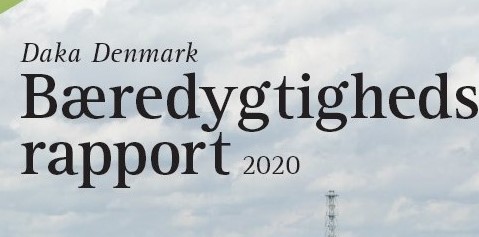Life cycle analysis shows Daka making a positive difference to the climate
16.03.2021
New life cycle analysis from Daka Denmark shows that Daka makes a significant positive difference to the climate through its recycling activities. The results of the analysis are published in the company’s first Sustainability Report, released today.

Daka Denmark has carried out a comprehensive life cycle assessment of all its activities. The analysis shows that in 2019 Daka’s operations saved the atmosphere 277,000 tonnes of CO2eq, equivalent to the annual climate footprint of more than 19,000 Danish households.
“The life cycle analysis is an important tool for us to document the difference we make when we recycle by-products from agriculture and slaughterhouses, as well as food waste. Our company is often subject to criticism about odours and myths about the incineration of dead animals, so we feel a need to show that the work our employees do every day has a crucial impact on agriculture and Danish society,” says Per Dunkelskov Thomsen, Director of Business Development and Public Affairs at Daka Denmark.
Daka displaces more Co2 than it consumes
The climate benefit comes when Daka’s factories convert animal by-products and food waste into feed ingredients, fertiliser and bioenergy, ultimately replacing soy proteins, palm oil, artificial fertilisers and fossil fuels. The saving of 277,000 tonnes CO2eq is a net saving, as the CO2 impact from Daka’s own production and transport activities is offset in the calculation.
“We can now clearly see and document how we are making a difference, and this motivates us to do even better, both in terms of getting the most out of the raw materials we receive and reducing CO2 emissions from our own activities,” says Per Dunkelskov Thomsen.
Daka Denmarks is partly owned by the German SARIA group, which, inspired by the Danish life cycle assessment, has now launched a similar analysis at group level.
Daka’s first sustainability report
The life cycle assessment is a key element of Daka Denmarks’ first sustainability report, which is published today and covers 2020. The report also provides insight into activities and results in areas such as odour measurement, working environment and the impact of factories on the environment and resources in general.
The report also explains Daka Denmark’s role in agriculture. In the light of Covid-19, the importance of preventing the spread of viruses or bacteria from animals to humans – or from animals to animals – becomes even clearer. This is where Daka’s role in the agricultural life cycle becomes truly visible, when dead animals and other animal by-products that may pose a risk of infection must be handled safely and hygienically all the way from farm to finished product.
“We are proud to be one of Denmark’s largest companies recycling valuable natural resources safely and sustainably. Our philosophy is that nothing should go to waste and that everything can be used. The Sustainability Report shows how we are doing this and what it means in the bigger picture,” says Per Dunkelskov Thomsen.
The plan is that Daka Denmark will publish an annual sustainability report in the future. Find more information about the life cycle assessment in Sustainability Report 2020
